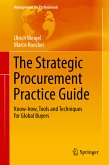Contents
- Determinants of value capture
- Bargaining structure
- Modeling the effect of bargaining structure on value capture
- Drivers of bargaining structure and empirical implications of the hierarchy strategy
Target Groups
- Researchers and students in the fields of technology management, innovation management, strategic business management, and supply chain management
- Managers and practitioners in the fields of business strategy, procurement, and supply chain management
The Author
Alexander Hoffmann is a researcher in the field of technology and innovation management at the TU München, Germany, and a management consultant.
The Editors
The series Innovation und Entrepreneurship is edited by Prof. Dr. Nikolaus Franke, Prof. Dietmar Harhoff, Ph.D., Prof. Dr. Joachim Henkel, and Prof. Dr. Carolin Häußler.
Dieser Download kann aus rechtlichen Gründen nur mit Rechnungsadresse in A, B, BG, CY, CZ, D, DK, EW, E, FIN, F, GR, HR, H, IRL, I, LT, L, LR, M, NL, PL, P, R, S, SLO, SK ausgeliefert werden.









